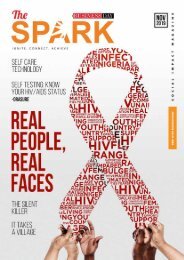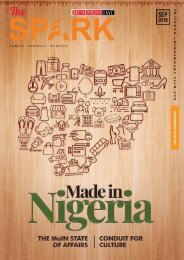Politics and Governance - More Than A Conversation
You also want an ePaper? Increase the reach of your titles
YUMPU automatically turns print PDFs into web optimized ePapers that Google loves.
www.thesparkng.com<br />
The Spark | Ignite/Connect/Achieve<br />
the funding coming directly from the federal budget. Added to the<br />
₦87.9 billion received by the DBN from international development<br />
finance institutions it meant that the DBN had about ₦128<br />
billion available to lend to MSMEs by the time it started lending<br />
operations in November 2017. Sadly, it was only able to provide<br />
₦182.3 million in loans to MSMEs by the end of 2017. Lending in<br />
2018 is expected to improve significantly as the bank claims to<br />
have provided loans to 35,000 beneficiaries since inception as<br />
at the end of November 2018. The intervention via DBN is more<br />
sustainable, should reach a larger group of MSMEs. Also, the DBN<br />
should become self-funding.<br />
Some other interventions have helped address the problem of<br />
accessing debt financing, but which are not directly funded by<br />
the federal budget, <strong>and</strong> so are not a function of fiscal policy. The<br />
Bank of Industry <strong>and</strong> Central Bank of Nigeria provided funding<br />
in some form to MSMEs with financing for the programmes<br />
coming from their balance sheets. These quasi-fiscal programmes<br />
provided about ₦46 billion in funding MSMEs in 2017 with the<br />
BOI’s SME Directorate driving the bulk of the performance by<br />
providing ₦40.9 billion in loans, <strong>and</strong> CBN’s MSME Development<br />
Fund provided ₦4.2 billion in loans. At the sub-national level,<br />
the LSETF provided ₦5.1 billion in loans, bringing total fiscal <strong>and</strong><br />
quasi-fiscal intervention in financing to MSMEs to ₦97.7 billion in<br />
2017. Commercial bank loans to SMEs in 2017 was ₦10.7 billion, so<br />
it is quite clear that SMEs rely heavily on these fiscal interventions<br />
to get vital credit.<br />
Despite these efforts, with a financing gap estimated at ₦9.6<br />
trillion, there is still quite a bit of work to be done. First, this<br />
administration’s interventions to date are focused on unlocking<br />
access to debt. For SMEs, the type of financing usually required<br />
is equity, <strong>and</strong> there has been no effort to increase the amount<br />
of equity funding available. Also, this can be done either by<br />
directly setting up an MSME growth capital fund, or providing<br />
guarantees that would encourage private investors to make<br />
equity funding available which has not happened. There is also a<br />
place for facilitating the provision of debt to MSMEs by existing<br />
commercial banks through the provision of guarantees or other<br />
risk-mitigating products. The DBN is making an effort in this<br />
regard, but its programme will need significant expansion given<br />
the quantity of financing that needs to be mobilised. Finally, the<br />
current intervention programmes need to be rigorously assessed<br />
for performance so that they can be improved (or terminated)<br />
such that the ultimate aim of enhancing economic outcomes is<br />
achieved.<br />
Keep up with Seun on Twitter <strong>and</strong> Instagram @seunsmith.<br />
@thesparkng<br />
5

















